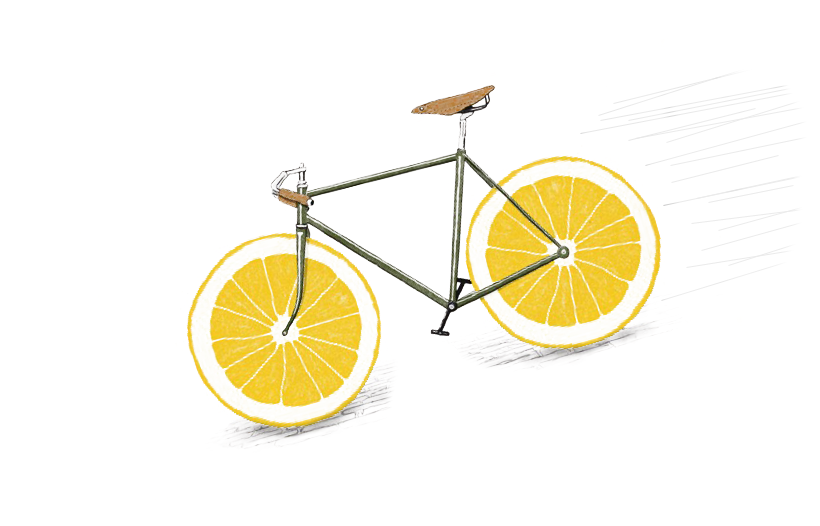Why I keep fixing my bike

// published 03/04/2015
I recently purchased yet another spare part for my bike. This time the front derailleur ceased to work (apparently the winter caused the lubricant in the joints to turn into a glue like, uncleanable substance). This forced me to buy a new one online - much to the amusement of my friends, which mocked me for spending two hours outside on a cold Sunday, desperately trying to fix my bike. Now normally I would just opt for a new bike - but because I'm currently on a budget this is not an option. The obvious second choice would then be to look for a used bike online. There are plenty of online market places which allow users to sell their used bikes. But I refrain from using them and this post is about the reasons why:
All the online markets for used bikes which I know are prone to be lemons markets. A market is considered a lemons market when:
- a buyer can't accurately assess the value of a product through examination
- there is an incentive for the seller to pass off a low-quality product as a higher-quality one
- sellers can't credibly testify the quality of their wares
- a continuum of seller qualities exists or the average seller type is sufficiently low
- there's a lack of public quality assurance
Today we will solely focus on the online market (which I assume constitutes a big part of all transactions with used bikes). Regarding the first requirement: One cannot accurately assess the quality of a bike on sale based on the pictures on the web and the description. Now obviously an experienced bicyclist who has had and repaired many bikes in his past would be able to visit each and every seller he's interested in and closely examine the bike in question. In that case there would be no asymmetry of information with regards to the quality. But to some extent that defeats the purpose of an online market place, where I would like to purchase my bike without travelling numerous kilometers to examine dozens of bikes by myself (because in the case of used bikes the transaction costs (for travelling) would quickly exceed the cost of the good).
Is there an incentive for sellers to pass off a low-quality product as a higher-quality one? This point isn't directly obvious without some explanation: Some online markets like ebay have public quality assurance (see the last point in the list above), which shows detailed reviews of the sellers and their past sales - this helps to prevent sellers from overstating the quality of their wares, because customers would leave a bad review and discourage potential future buyers. However the average seller on a used bike market most likely sells bikes rarely and hence there would be only limited information on previous customer experiences available. Notwithstanding the problem that a seller can just create a new online profile. This is reflected on a typical online market place for used bikes like velomarkt.ch where there's only a very limited seller profile available. On velomarket.ch it shows how many advertisements they have and on what level (probably based on previous sales) they are - unsurprisingly most of the sellers are at the lowest level. Now, because most of the sellers only intend to sell one bike they don't need to worry about customer satisfaction and can oversell the perceived value of their bike. Should they get caught they can most likely just generate a new profile.
The third point is very interesting because it's a problem which is being tackled in the market for used cars. On autoscout24.ch for example, certain advertisements carry a specific certificate which guarantees to some extent the quality of the car. I don't know how well it works in practice, but let's assume it's not entirely without merit. Sadly such a certificate is still missing in the market for used bicycles (probably because a good assessment of a bike's qualities is quite expensive with regards to the selling price).
Lastly the fourth point causes lemon markets to drive out the sellers of high quality wares, further lowering chances of making a satisfying purchase. As we mentioned in the previous paragraphs, there's no reliable way for a seller to testify the quality of their bike (whether good or bad). Because the customer is rational and realizes this (or does he?) he has no way to know the quality of the bikes accurately and he must assume that they are all of average quality. This gives an obvious disincentive to sellers with high quality bikes because they most likely won't be able to sell their bikes at a high price. Because regardless of its quality it will usually be perceived as average. Hence the high quality sellers refrain from selling their bikes on such a platform which then in turn drives down the overall quality on the market (loss of higher quality bikes, perceived average quality drops). Once this has happened - the high quality bikes (the cherries) are gone and only the "lemons" remain.
Now - I'm not saying that the market for bikes has insurmountable problems (hence this article is also not part of the "why is Anarcho-capitalism a bad idea?" series) but the market has some problems which (to my knowledge) no online market place has addressed yet. All of the hurdles described could essentially be overcome: For example public quality assurance could be achieved by making sellers transparent across all platforms and tracking their reputation based on their real identity (eg. via facebook) and not some (fakeable) online persona. Regarding information asymmetry: A startup could offer a cheap bicycle quality assessment (for a few francs) which the seller then could simply link to. This would reduce the information asymmetry to an uncertainty about the quality of the company which does the assessment. And that information is much cheaper to obtain than checking dozens of sellers yourself.
I'm certain there are already some entrepreneurs out there which have realized these shortcomings in the market for used bikes and are busy solving these issues. But until such a new market place arises I'll be busy fixing my bike and frequenting the markets for spare parts.
Image credit: "ZEST" by speakerine https://www.threadless.com/designs/zest-2
